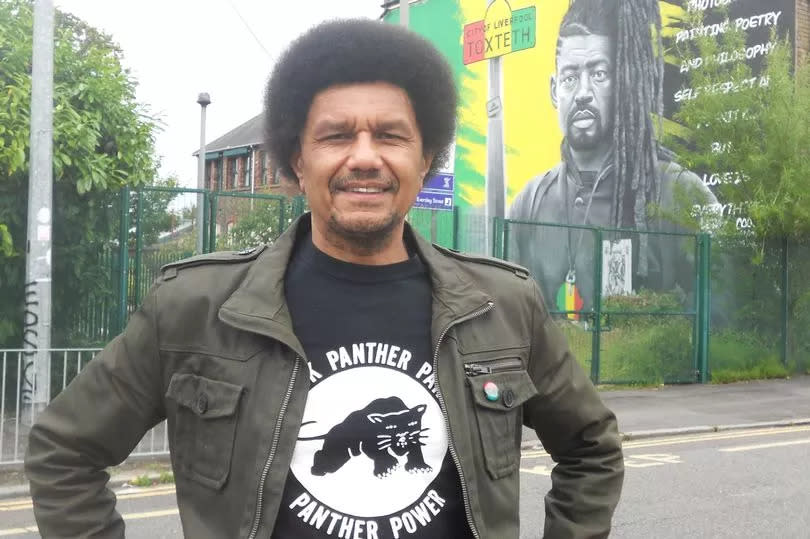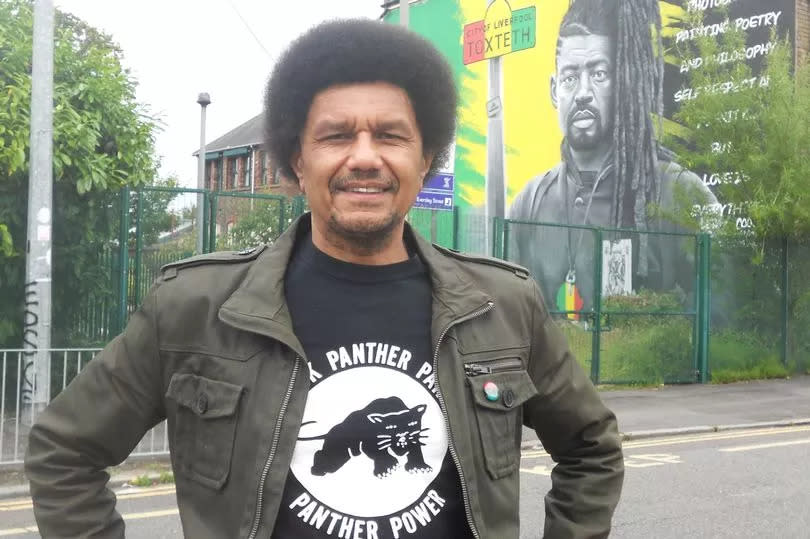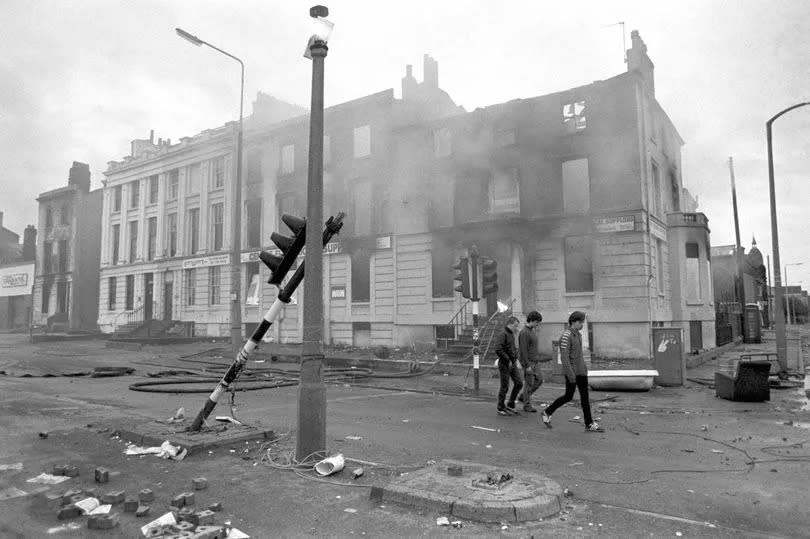'We stood up to oppression in an uprising, not a riot': Toxteth 1981's legacy in Liverpool 8

43 years ago civil disturbances in Toxteth exposed long-standing tensions between the Liverpool 8 community and police. Widely described as the "Toxteth Riots", this description is challenged by those who see the events as a necessary reaction to long-standing issues in the community.
On today's anniversary of their beginning, the Liverpool ECHO community reporter for Liverpool 8, Patrick Graham, who was a teenager at the time asks why people felt the need for an uprising in 1981 - and offers his opinion on the events and their impact.
Patrick remembers the "last straw that broke the camel's back" causing people to fight against what was widely felt to be years of oppression from the establishment.
He writes: Aged 13, I was out with friends less than a hundred yards from where I lived off Selborne Street, Liverpool 8 and witnessed the event that sparked the 1981 Uprisings.
On a pleasant summer afternoon, Friday July 3, Leroy Cooper was stopped on a motorcycle by police. The bike was not stolen, and for many members of the community this was that last straw that broke the back of the camel and the Black people of Toxteth. After several nights of conflict, in July and August, it had always been a question of when this would happen rather than why?
READ MORE: Teacher lied because he was 'terrified' over what he had done
READ MORE: Get information on summer events sent straight to your phone
Toxteth born community activist and writer Jimi Jagne explained why he, and others, felt it necessary to take to the streets. Jimi told the ECHO: "It was a last resort defence of our neighbourhood streets.
“The L8 Rebellion, making up part of the wider national Uprising that year, was not spontaneous or criminal but an inevitable consequence of perilously toxic circumstances. Our families lived with decades of an imposed ghetto existence and our youth, for almost as long, had faced the persistent threat of brutal police harassment and criminalisation".

Along with what I see as the socio-economic situation of the times, poor and discriminatory housing allocation, a lack of jobs for Black people, racial terrorism when you left L8 and a newly elected Tory government only served to compound these issues. Also, across the country we saw Black communities rise up for similar reasons.
With no apparent solution to discriminatory and racist practices, what voice did the community have? No matter how loud they shouted, they were not heard or listened to. What could be gained by such actions in fighting the establishment in this way - would it listen, would it help?
Jimi said: "Initially, we shook the establishment rigid. They'd never, before '81, anticipated a Black community capable of urban rebellion on British streets. For the first time we alerted mainstream society to the fact it wasn't such a great life, after all, being Black and British.
"Over the long term, the rebellion proved to be a landmark moment for racial politics and social change, more generally, in Liverpool and the rest of the country".
A founding member of the Charles Wotten Centre; the Black led further education college in Toxteth, Albert Fontenot, added: "I think the main benefits that came out of it politically was the fusing together of our thoughts, as in Black people of Liverpool. It taught us to act in unity and, at least, to recognise the benefits of acting in unity.
"Resistance has to be done in unity otherwise you just get battened down. Everyone was involved, including white people who had their own grievances with the police and establishment. Unlike us, it wasn’t based on race.
"I recall white people literally diving through the air onto police lines. Many were shouting that 'we remember Jimmy Kelly' (A man who died in police custody in June 1979). When so many of us act from the anger of oppression, in a positive sense, it was uplifting. We could have run through walls.
"We had old people urging us on, old men and old women, who were not throwing bricks but urging us to do it in their stead. They couldn’t, so the next best thing was to urge us to do it".
The building next to the Charles Wotten Centre was burning; a fire appliance was attending, as the conflict happened close by, when the people surged forcing the police to retreat. Albert said: "The sight of 1,000 policemen fleeing from us, the impact that must have had on us, that is the thing I most remember.
“They were fleeing from our unity and the ferocity of our unity. The fireman fled with the police although they were under no threat from the people".

Albert and another co-founder of the Charles Wotten Centre, Louis Julienne, took control of the hose. They doused both buildings to prevent the fire from spreading and for a time, helped to put out the fire.
Maria O'Reilly, who worked in Liverpool 8 Law Centre, which fought for community rights, justice, better housing, employment, policing and more, was born out of the ashes of the Uprisings. Maria said: "We stood up to oppression in an uprising, not a riot. The government realised we have to negotiate and can't just trample all over them as they were used to doing.
"They had to look at their own policies and the impacts they have. We were excluded from many things, going to university, social work, jobs and more. It was like an apartheid system and was seen as normal.
"Lots of uprising went on in different ways after 1981. We have had to fight for everything, and people now are still having to fight for everything".
I feel the community got a sense of self esteem and the government realised Black communities mattered. Maria added: "We were not getting a fair deal and not treated the same as the White working class.
"We had no service for Black elders, discrimination in housing, no home help for Black people, all things we were paying for but not getting them, never mind your kids getting battered. All the stuff was done by the community; issues with immigration sorting things out, the Law Centre, mental health, Amadudu (women's refuge) and more.
"These things were not given, we had to fight for them. We were invited around the table and had a say in setting the agenda. Before (1981) we were not, and we were not to be patronised at the table".
Maria spoke of current marches and protests being "an uprising in a form", and how she feels the government is "blaming everything on immigrants”. Pointing to the rise of the far right across Europe including in France's recent parliamentary elections, she added: “The politics of today is rife for fascism to thrive."
She said: "Nothing is being done to stop things like a genocide going on in front of your eyes which is one of the problems, being disenfranchised from politics.
"On the eve of the election, and for some time, now all I see is increasingly immigrants and people of colour being blamed for many of the ills of society. We see authoritarian laws and policies being introduced which oppose striking, anti-war protest, environmental protests and more, and I worry these things are possibly setting the stage for general uprisings more than we see now."
Jimi said: "Uprisings occur only when the State goes so far as to tear directly into the heart of a particular community and begins ripping it apart. The miners strike of '84-'85 is another good example of a classic uprising.
"I don't think another uprising is entirely out of the question but it'll take more than what we've seen from government, so far, to provoke one. Government leaders have no serious interest in learning lessons and recent legislative changes limiting our right to protest make a bad situation worse."
He added: "However, a British government would, in the end, rather police violence as it emerges and demonise those responsible rather than make the concessions sufficient to avoid extreme protest being mounted in the first place".
I say 1981 should be remembered for what it was, an Uprising against an oppressive establishment; discrimination, brutality and racism when it came to Black people. Not forgetting the White working class also had grudges to bear against with what they too experienced at the hands of the police and being marginalised within society; facing discrimination due to being working class and where they lived.
The next government needs to take note of the situation that’s evolving and address it by being more in touch with all sections of society. If we want to live in a fair, equal and equitable society, those who govern it have to set an example in how they oversee it if they wish to avoid the scenes of the 1980s when people felt they had no choice but to rise up.
Don't miss the biggest and breaking stories by signing up to the Echo Daily newsletter here
Get the latest updates on the General Election to your WhatsApp

 Yahoo News
Yahoo News 
